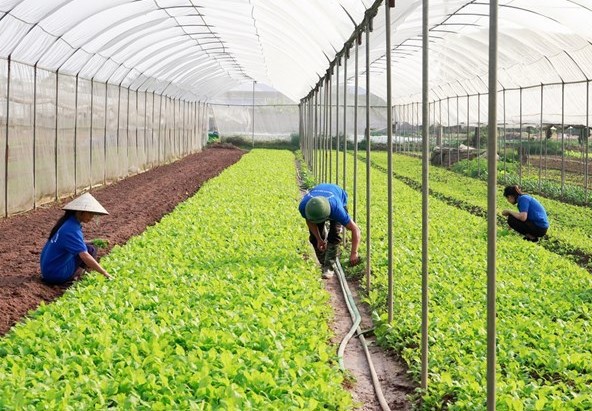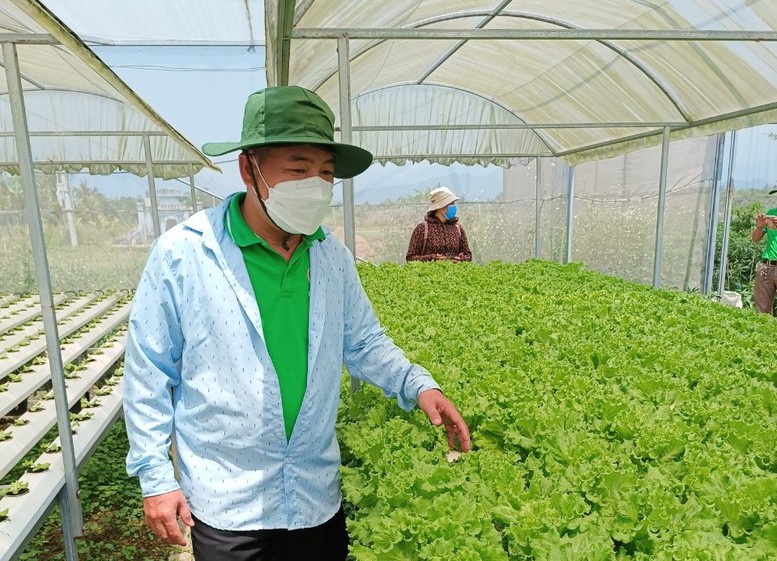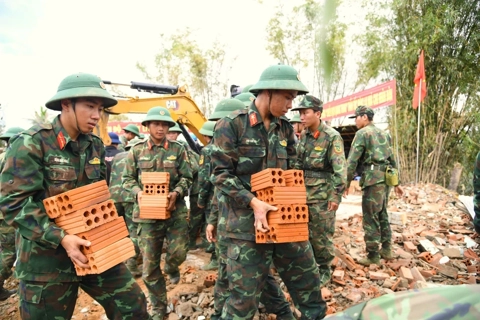Hanoi strengthens IT application in food safety management
Hanoi's agro-food product traceability system has improved the transparency of information for some 653 enterprises with almost 11,000 sets of traceability codes for agricultural, forestry and fishery products.
In order to safeguard consumer rights, increase information transparency, and track the provenance of agricultural, forestry, and fishery products on the market, the Hanoi Department of Agriculture has pushed the use of information technology (IT) in food safety management.
Hoang Van Tham, Director of the Chuc Son Organic Vegetable Cooperative in Chuong My District, told The Hanoi Times that the cooperative's products are sold through modern distribution channels, including supermarkets and online marketplaces.
"The traceability stamp has helped the cooperative stabilize the consumption of vegetable products in the market. The cooperative has been supplying three tons of vegetables daily to supermarkets, major hospitals, and schools in Hanoi. We have earned about VND11 billion (US$8 million) per year," said Tham.
Safe vegetable production at the Chuc Son Clean Vegetable and Fruit Cooperative in Hanoi's Chuong My district. Photo courtesy of the cooperative |
Nguyen The Lam, Director of the Khanh Phong Agricultural Cooperative in Me Linh District, told Hanoimoi that QR codes have been used to track the origin and production process of products to build consumer trust.
"To learn about the product's origin and avoid confusion with another product or brand of the same type in the market, consumers can simply scan the QR code attached to the product with their smartphone," Lam said.
Nguyen Thi Thu Hang, director of Hanoi's Sub-Department of Agriculture, Forestry and Fisheries Quality Management, said that Hanoi's agro-food traceability system has now improved the transparency of information for some 653 enterprises with nearly 11,000 sets of traceability codes for agricultural, forestry and fishery products.
"Since the beginning of 2024, the agricultural sector has been operating the 'System for Tracing the Origin of Agricultural, Forestry, Aquatic and Food Products in Hanoi' (check.hanoi.gov.vn). The system has provided accounts for more than 3,500 enterprises and nearly 13,950 products," Hang said.
She added that businesses and cooperatives are using QR codes to help them and consumers avoid food of unknown origin in the domestic market. Agricultural products labeled under safe production chains are sold at 10 to 30% higher prices than other products.
The use of IT in production and consumption has also gradually improved the ability of cooperatives and companies to produce and deliver goods. Smartphones allow users to access product details such as manufacturing date, expiration date, and country of origin," said Hang.
To promote the use of QR codes in the production and trade of farm produce, Dam Van Dua, Director of Dong Cao General Service Cooperative in Me Linh District, expressed his hope that Hanoi's departments and sectors will continue to support cooperatives in applying IT in production and uploading information on the origin of farm produce to the city's traceability websites.
"We will continue to closely manage farmers' daily production logs and then upload the information to traceability management systems. I also hope that Hanoi authorities will establish a link between farms and modern sales channels in the consumption of agricultural products," Dua said.
Nguyen Thac Hung, Vice-chairman of the Dan Phuong District People's Committee said that the district has strengthened strict food safety management and promoted the use of QR codes to track products
It has also provided training to all production facilities in the district on how to implement a traceability system for agricultural goods and products. In an effort to increase consumption of agricultural products, the district has also helped cooperatives participate in trade fairs, Hung said.
The hydroponic vegetable model creates a stable vegetable supply that is unaffected by the weather. Photo: VGP |
By 2050, Hanoi hopes to establish 50 production chains for key agricultural products, according to Chu Phu My, Director of the Hanoi Department of Agriculture and Rural Development. "These chains will have concentrated growing areas and use IT and QR codes to promote the traceability of these products."
"To make information transparent, Hanoi will encourage and support cooperatives in the production, processing, and trading of agricultural, forestry, and seafood products by implementing traceability and trading activities on e-commerce platforms. This will improve the competitiveness of businesses and enhance the distribution of goods," My said.
"Hanoi's agriculture sector is aware that promoting digitalization is essential, and has called for the construction of an electronic sales channel. To renew trade promotion activities, Hanoi's agriculture sector will focus on developing online trade promotion channels and promoting digital transformation," My added.
According to Nguyen Dinh Hoa, Deputy Director of the Hanoi Department of Agriculture and Rural Development, the Hanoi People's Committee will allocate more than VND10 billion ($7.3 million) from the city's budget to help districts purchase machinery and equipment for digital transformation in the agricultural sector in order to promote the digital transformation process in the agricultural sector.
To manage, monitor, and control agricultural, forestry, and fishery products in the market and improve the efficiency of activities for safe agricultural production and business, Hoa said, "The department will continue to support digital transformation application software in managing production and business activities."
He affirmed that in the coming period, the department will develop the application of electronic information systems using QR codes to trace the origin of safe agricultural, forestry, and fishery products in Hanoi.
"In addition, we will manage and develop e-commerce markets for the consumption of safe agricultural, forestry, and fishery products; and support branding and promotion of agricultural products to ensure food safety and quality. The department will also coordinate with localities to organize training courses on digital skills and digital environment; guide businesses in the parcel and delivery connection processes, online payment accounts to serve transactions on e-commerce platforms," Hoa said.












